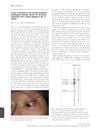 January 2008 in “Springer eBooks”
January 2008 in “Springer eBooks” Thyroid disease can cause hair loss and treating thyroid problems might help with hair disorders.
 19 citations,
June 1999 in “Steroids”
19 citations,
June 1999 in “Steroids” Different halogens on progesterone derivatives can either block or mimic male hormone effects, depending on their type and amount.
 36 citations,
October 2021 in “Frontiers in Endocrinology”
36 citations,
October 2021 in “Frontiers in Endocrinology” Insulin resistance and high male hormone levels are major causes of Polycystic Ovary Syndrome.
 5 citations,
November 1992 in “Current problems in dermatology”
5 citations,
November 1992 in “Current problems in dermatology” Glucocorticoids are powerful anti-inflammatory drugs that must be used carefully to avoid serious side effects.
 7 citations,
February 2010 in “British Journal of Dermatology”
7 citations,
February 2010 in “British Journal of Dermatology” A woman with a rare autoimmune disorder had a blister on her eye and unique immune reaction, which was effectively treated with medication.
January 2024 in “International journal of molecular sciences” A brain-made hormone can protect against memory-related brain damage caused by harmful proteins.
 134 citations,
April 2020 in “Journal of Cosmetic Dermatology”
134 citations,
April 2020 in “Journal of Cosmetic Dermatology” Male pattern hair loss could hint at androgens affecting COVID-19 severity.
August 2024 in “Journal of Controlled Release” A new treatment using hybrid vesicles with gold nanoparticles and finasteride significantly improves hair regrowth for androgenetic alopecia.
 November 2022 in “Journal of Herbal Medicine”
November 2022 in “Journal of Herbal Medicine” Certain compounds found in edible mushrooms may help treat hair loss.
 3 citations,
January 2022 in “Precision medicine and clinical omics”
3 citations,
January 2022 in “Precision medicine and clinical omics” Beta-sitosterol and stigmasterol might help prevent hair loss by blocking a specific enzyme.
6 citations,
November 2018 in “Journal of molecular histology” Testosterone increases fluid secretion and aquaporin expression in the vas deferens, which is important for male fertility.

Melatonin applied to the scalp helps treat early-stage hair loss in men and women.
 November 2023 in “ACS Omega”
November 2023 in “ACS Omega” New liposome treatment successfully delivers CRISPR to deactivate a key enzyme in androgen-related disorders.
13 citations,
January 2012 in “Dermatology” Eruptive vellus hair cysts are rare, benign skin lesions that are hard to treat.
 March 2014 in “Medicina cutánea ibero-latino-americana”
March 2014 in “Medicina cutánea ibero-latino-americana” Melatonin applied to the scalp helps increase hair density in people with early hair loss.
 July 2023 in “Journal of Cutaneous and Aesthetic Surgery”
July 2023 in “Journal of Cutaneous and Aesthetic Surgery” Combining platelet-rich plasma with other treatments may improve hair growth in people with hair loss, but more research is needed.
December 2022 in “Scientific Reports” Compound 4 is a promising treatment for hair loss with low toxicity.
 31 citations,
March 2015 in “The Journal of Steroid Biochemistry and Molecular Biology”
31 citations,
March 2015 in “The Journal of Steroid Biochemistry and Molecular Biology” Neuroactive steroids could become safe, effective treatments with more understanding of their complex brain actions and metabolism.
2 citations,
December 2017 in “Theriogenology” Testosterone increases acidification in the vas deferens by up-regulating V-ATPase.
 August 2023 in “Journal of Cosmetic Dermatology”
August 2023 in “Journal of Cosmetic Dermatology” Exosomes from hair papilla cells and the Chinese medicine Liao Tuo Fang can potentially promote hair growth and could be used to develop hair growth drugs.
 28 citations,
August 2000 in “Current Opinion in Chemical Biology”
28 citations,
August 2000 in “Current Opinion in Chemical Biology” Future osteoporosis treatments should focus on increasing bone growth, with many promising options available.
 34 citations,
February 1993 in “Journal of steroid biochemistry and molecular biology/The Journal of steroid biochemistry and molecular biology”
34 citations,
February 1993 in “Journal of steroid biochemistry and molecular biology/The Journal of steroid biochemistry and molecular biology” Certain 4-azasteroids are effective at blocking the enzyme that processes testosterone in human skin and could help treat acne, excessive hair growth, and male pattern baldness.
 27 citations,
September 1999 in “Journal of Investigative Dermatology”
27 citations,
September 1999 in “Journal of Investigative Dermatology” Human skin cells contain Protease Nexin-1, and male hormones can decrease its levels, potentially affecting hair growth.
 January 2014 in “American Journal of Medicine and Medical Sciences”
January 2014 in “American Journal of Medicine and Medical Sciences” Minoxidil, originally a blood pressure medication, is effective in treating hair loss in men and women, with different strengths recommended for each.
 30 citations,
December 2017 in “Medical Hypotheses”
30 citations,
December 2017 in “Medical Hypotheses” The model suggests that scalp tension could lead to hair loss, with factors like blood vessel hardening, enlarged oil glands, and poor microcirculation also playing a role. It also hints at a possible link between skull shape and baldness pattern.
 130 citations,
September 1990 in “Journal of the American Academy of Dermatology”
130 citations,
September 1990 in “Journal of the American Academy of Dermatology” Flutamide effectively reduced excessive hair growth and improved related symptoms in hirsutism patients without significant side effects.
 42 citations,
May 2003 in “Mini-reviews in Medicinal Chemistry”
42 citations,
May 2003 in “Mini-reviews in Medicinal Chemistry” New steroidal compounds could be effective for treating conditions related to 5α-reductase enzyme activity.
4 citations,
January 2023 in “Andrology” The testes produce sperm and hormones essential for male development.
 1 citations,
March 2021 in “The Journal of Sexual Medicine”
1 citations,
March 2021 in “The Journal of Sexual Medicine” The letter suggests testosterone replacement therapy might worsen COVID-19 outcomes.
 11 citations,
February 2018 in “Archives of Pharmacal Research”
11 citations,
February 2018 in “Archives of Pharmacal Research” Finasteride reduces melanin production, possibly treating hyperpigmentation and melanoma, but needs more safety research.























